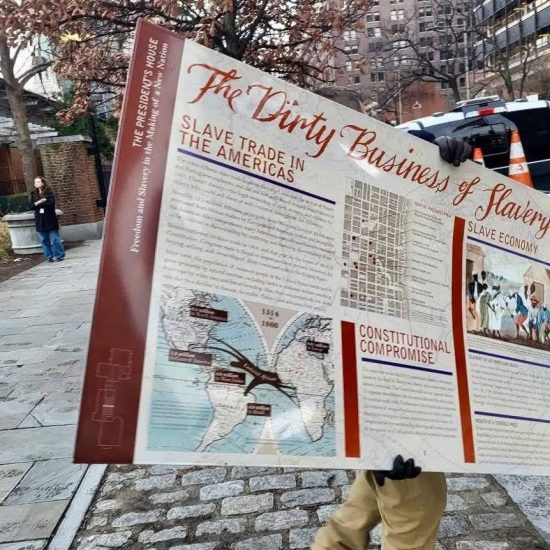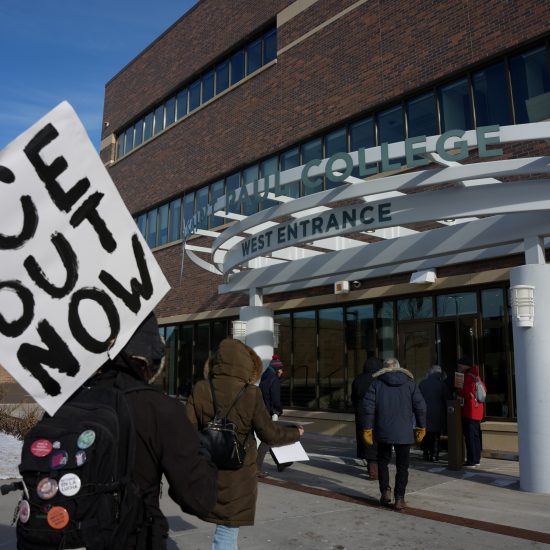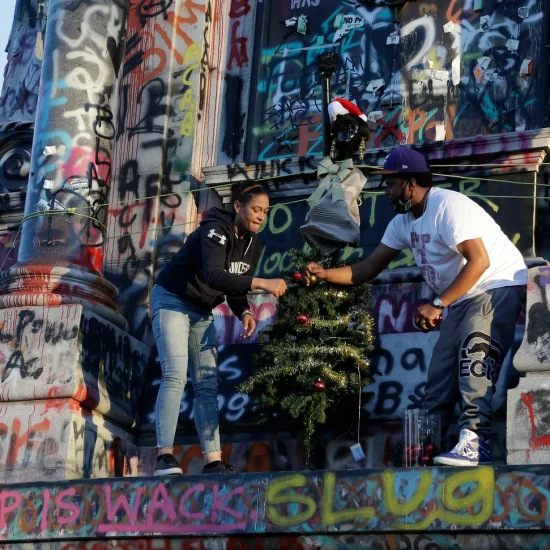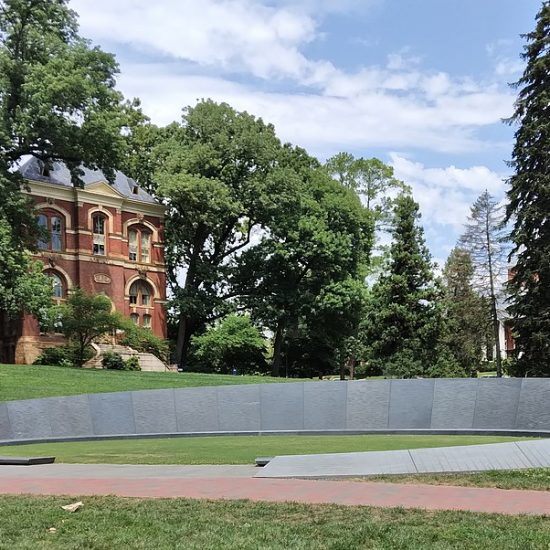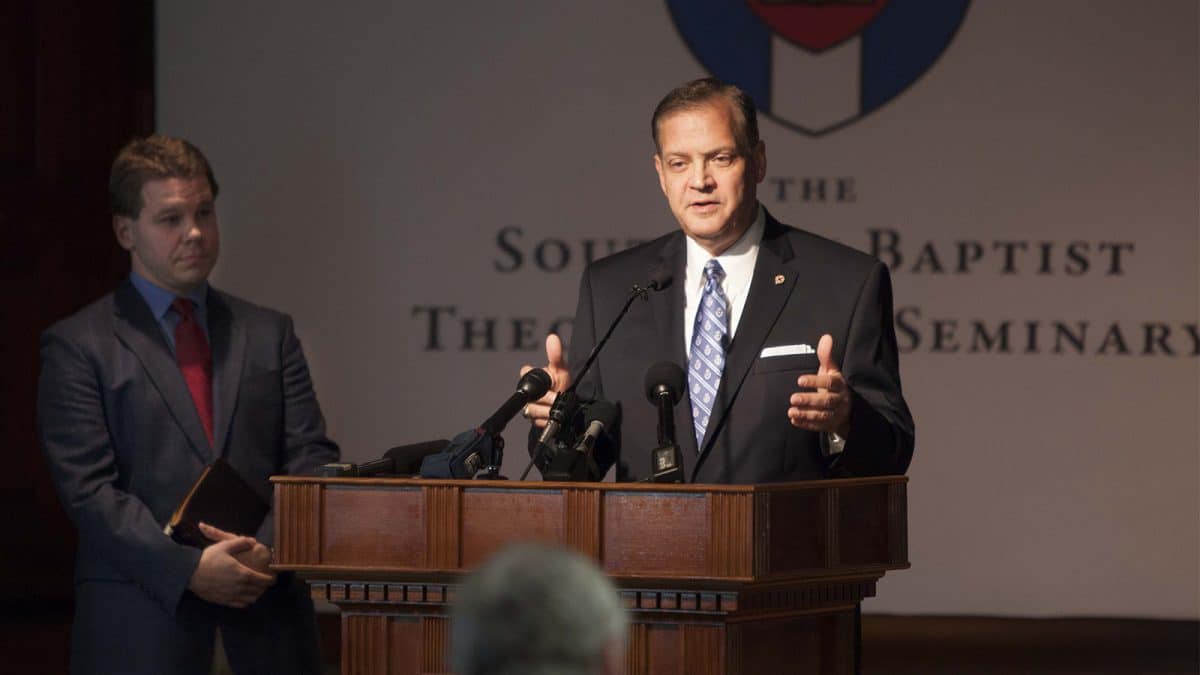
(RNS) — In December of 2018, Albert Mohler, longtime president of the Southern Baptist Theological Seminary, released a report detailing and denouncing the school’s legacy “in the horrifying realities of American slavery, Jim Crow segregation, racism, and even the avowal of white racial supremacy.”
The report was a historical reckoning for one of the nation’s largest evangelical seminaries, Mohler said at the time. While it denounced the racism in the school’s deep history, the report avoided any assessment of the school’s more recent past, including Mohler’s own time there as a student and his tenure as a president.
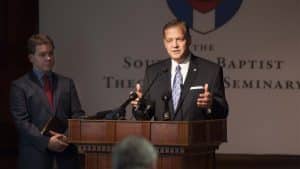
Albert Mohler, president of the Southern Baptist Theological Seminary, speaks with the press on Oct. 5, 2015. (Emil Handke/Southern Baptist Theological Seminary)
Mohler’s views about race and slavery came under scrutiny this week after comments he made in a conversation with Larry King in 1998 recently resurfaced. In that interview, Mohler said that while the Bible does not endorse slavery, it does require slaves to obey their masters. When asked if that rule applied to runaway slaves, like the famed Harriet Tubman, he said that there is no loophole for disobeying.
On Friday (May 15), Mohler told Religion News Service he was wrong.
“It sounds like an incredibly stupid comment, and it was,” he said, after hearing his remarks from 1998. “I fell into a trap I should have avoided, and I don’t stand by those comments. I repudiate the statements I made.”
A review of documents, transcripts, videos, audio clips and interviews relating to Mohler’s beliefs and behaviors as a student and as the school’s president reveal Mohler may have more to repudiate and repent of.
A Secret Society
Like many good stories, this one begins with something of a mystery.
Growing up in the inner-sanctum of Southern Baptist life, I’d heard rumors of an exclusive, all-white secret society on the campus of Southern Seminary. People claimed it was for “elite” students favored by the school’s administration. Members who proved loyal had the chance to be fast-tracked into powerful positions within the denomination. Think of it as Yale University’s mysterious “Skull and Bones” club, except for rising Southern Baptist leaders.
But no one I talked to could say for sure what the club had been about. So I went looking.
It turns out that a secret society did exist at Southern Seminary from the early 1900s and continuing at least through the 1980s. In fact, Mohler served as the group’s president when he was a student. The club’s name? “Dodeka,” derived from the Greek word for the number 12. Membership was limited to twelve married student couples.
According to a 1964 copy of the society’s constitution kept in seminary archives, one of the chief purposes of the club was “to promote and develop among its members the study of literature and a deeper understanding of the culture in which they live.” Potential membership was restricted to those students who exhibited a “high standard for scholarship” and “an aptitude for literature,” and procedures were laid out for the electing of officers all the way down to a sergeant-at-arms.
There is no mention of a race requirement in the society’s constitution, but a membership list spanning 1924 to 1966 includes the names of notable segregationists and white supremacists, such as Douglas Hudgins, the controversial pastor of Jackson, Mississippi’s famously segregated First Baptist Church.
In a video posted online from a 1993 question-and-answer session with students at Southern, Mohler admitted that he had been a member of Dodeka, which he called “basically a dinner club.” He then claimed there was “nothing sinister” about it, but still vowed to shut it down.
In an audio clip acquired from another seminary’s archives, now-disgraced Southern Baptist leader Paige Patterson recounts his concerns about Mohler’s past involvement in the society, which Patterson said was “an extremely white organization, there were not blacks in it ever.
In a telephone interview, Mohler told me that the club was indeed secretive, elite, and has close ties to both the seminary faculty and administration. However, he said he never saw and was not aware of any race requirement for membership.
“When the organization was established in the early 1900s, Southern Seminary had only white students. So the makeup of the membership was a function of the enrollment,” he said.
But the school had long been integrated by the time Mohler arrived on campus in the 1980s. In fact, Southern was integrated by three black students in 1951.
Mohler did not recall whether any black people were ever admitted to the organization or even applied for membership, but regardless, he says he regretted his involvement and would not join such a secret organization today.
The founding dean of Wake Forest University’s School of Divinity, Bill Leonard, was Mohler’s church history professor at Southern Seminary in the 1980s. Leonard says he knew Mohler was a member of Dodeka, but he first became concerned about Mohler’s views on race during a conversation with Mohler in 1990 in the lobby of Louisville’s Galt House Hotel.
“Al and I were talking about how he believed that Adam and Eve must be real historical figures, and I told him that if a person believed that, they also had to agree with the Apostle Paul’s views on slavery,” Leonard told me. “He replied that he did agree, and he said that if we lived in a society where slavery was legal, then Christians would have to follow Paul’s statement about the treatment of slaves.”
After the conversation ended, Leonard convinced himself that he must have misheard Mohler.
“Based on his way of reading the Bible, he accepted slavery as a social given,” Leonard said. “It’s the way Southern slaveowners read the Bible, but I couldn’t believe any thinking Christian believed that at the time.”
In 1993, Mohler was appointed to be president of his alma mater at a mere 33 years old. Conservative factions within the denomination believed him to be a capable culture warrior willing to weed out theological progressives from the seminary’s faculty and argue for literal interpretations of the Bible.
And so he did.
But he went further than that in transforming the campus environment, said Eric Johnson, a two-time Southern graduate and black pastor who says the school’s approach to race shifted upon Mohler’s election. When Mohler arrived, the school had become more welcoming to black students. That changed in 1993, said Johnson.
“Before (Mohler) arrived, the school had a lot of movement toward equality, and we celebrated MLK day each year,” Johnson said. “But when Dr. Mohler came in, the African American student club called ‘Harambe’ got shut down, and we stopped celebrating MLK Day. Those who were interested in contextual theology and black theology were replaced with people who had a more conservative stance. And when it came to cultural issues and race, the teaching became suspect. No one would talk about how Augustine or other church fathers were from North Africa. Instead, they skipped straight to European theology and the Reformation.”
Kevin Cosby, a graduate of Southern Seminary who is president of Simmons College of Kentucky, a National Baptist Convention of America school founded in Louisville by a former enslaved person, echoed Johnson’s account of those years.
“Before Al Mohler arrived, the most revered black preachers in America were giving sermons in the chapel, and scholars in the tradition of Martin Luther King Jr. were brought in to teach each January,” Cosby said. “That tradition ended under Mohler.”
An Unfortunate Interview
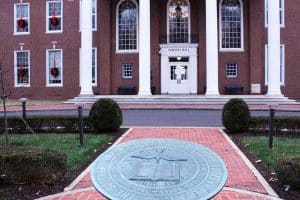
Norton Hall houses the president’s office at Southern Baptist Theological Seminary in Louisville, Kentucky. (Adelle M. Banks/Religion News Service)
Throughout the 1990s, Mohler’s influence stretched well beyond his genteel seminary campus. He made regular appearances on cable news shows and penned articles in national publications arguing for “traditional Christian values.” Soon, Mohler was widely considered one of America’s leading religious public thinkers. But it was on this larger stage that he again articulated the view that had disturbed Leonard years earlier.
On June 12, 1998, Mohler was a guest on “Larry King Live,” along with the Rev. Jerry Falwell Sr. and Patricia Ireland, then-president of the National Organization for Women, to discuss the Southern Baptist Convention’s belief that women should submit to their husbands. The conversation eventually expanded to include a discussion of slavery.
According to a transcript obtained from CNN, Mohler asserted that he agrees with the New Testament’s command for enslaved persons to obey their masters. This doesn’t mean the Bible “endorses” slavery, Mohler said, “but it does say, if you’re a slave, there’s a way to behave.”
King asked whether such a belief meant he would “condemn those who ran away,” like Harriet Tubman.
“Well, I want to look at this text seriously, and it says submit to the master,” Mohler replied. “And I really don’t see any loophole here as much as, in terms of popular culture, we’d want to see one.”
Seemingly stunned, King cut to a commercial break.
When the program returned, the late Rev. Falwell took issue with Mohler’s position.
“If I had lived back during slavery, I would have started and operated an underground railway to Canada,” said Falwell. It’s striking from a man who cut his ministerial teeth opposing the civil rights movement.
Jemar Tisby, a historian and author of The Color of Compromise: The Truth about the American Church’s Complicity in Racism, said that Mohler’s interpretation of the Bible’s teachings on slavery is neither new nor novel. It’s the same interpretation used to justify slavery and segregation.
“Mohler’s way of reading the Bible sounds almost identical to slavery apologists in the years leading up to the Civil War and to white Christians who tried to use the Bible to justify segregation in the mid-20th century,” said Tisby, president of The Witness, a Black Christian Collective. “Some things never change, I guess. White evangelicals have always used scripture in order to reinforce white supremacy.”
Cosby, whose grandfather was among the three first black people to integrate the seminary in the 1950s, said that Mohler described his view of slavery in an airplane conversation in the early 2000s.
“I have never forgotten sitting on that airplane and hearing Al Mohler tell me that the scripture does not condemn slavery and that the Bible calls upon slaves to obey their masters,” Cosby said.
Ghosts of the Past
In the past, Mohler has been reluctant to distance himself from Southern Seminary’s historic ties to slaveholders and segregationists. In 2005, Mohler stood in full regalia with a seminary medallion around his neck and proudly accepted the school’s highest academic honor: the Joseph Emerson Brown Chair of Christian Theology.
Brown was a fiercely pro-slavery Confederate governor of Georgia during the Civil War until 1865, during which time he owned 19 enslaved persons and several farms in Cherokee County, Georgia. He never denounced his pro-slavery position, and following the Civil War, he amassed a large sum of wealth by leasing convicted prisoners from the local government to engage in free labor. He was also a trustee at the Southern Baptist Theological Seminary, and in the 1870s, he donated a large sum of cash acquired from enslaved labor to keep the institution solvent.
“Brown is considered an enemy of black America. In fact, black people back in the day used to sing about him, and the lyrics said, ‘Joseph E. Brown was a mean old man,’” Cosby told me. “Imagine someone being named the Joseph Goebbels Professor of Theology and being proud of it. That’s what this is like.”
Mohler told me that he had “no conception” of Brown’s racist past when he took on the honor. Since that time he has learned more about Brown and said he is ashamed to be connected to him.
“I am not proud to wear that name, and I have no joy in having to talk to you about Joseph Emerson Brown,” he said. “I feel nothing but pain.”
Mohler said he has not decided to drop the title or forfeit the honor.
“I am not settled in my mind about how the nation or Southern Seminary should address the troubling past of its institutions on this issue.”
After this story was published, Mohler clarified what he knew about Brown’s past before receiving the honor. Mohler said he was aware Brown was a Civil War general and a slave owned but he was not aware at the time of “Brown’s horrifying involvement in the convict labor system and other atrocities.”
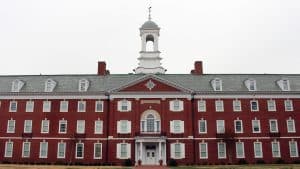
Boyce College on the campus of Southern Baptist Theological Seminary in Louisville, Kentucky, on Nov. 29, 2018. (Adelle M. Banks/Religion News Service)
In 2018, following the release of the report on racism, Mohler was asked whether he would change the name of the seminary’s undergraduate college, which is named after the seminary’s first president, a slave owner named James Petigru Boyce. Mohler dismissed the idea: “Taking the names off in a sense is just an effort to hide. This is our story. This is exactly who we are.”
Since the 2018 report admitted that Southern Seminary was unjustly built with enslaved and convict labor, Cosby joined a group of mostly white progressives who sent an open letter to Mohler, urging Southern Seminary to pay reparations to Simmons College in order “to make a global moral witness by publicly bearing the fruits of repentance as the natural and right response to its historic and undisputed role as chief apologists in defense of slavery.”
Mohler rejected their request.
The seminary president raised the ire of many black Christians with ties to the evangelical world this spring when he announced his intent to vote for Donald Trump, after years of holding out as a prominent dissenter. Mohler had once been a vocal opponent of Trump, whom he called a “sexual predator” who “fails the baseline test of character.”
“If I were to support, much less endorse, Donald Trump for president, I would actually have to go back and apologize to former President Bill Clinton,” he said in 2016.
However, this April, Mohler announced that he had changed his mind, vowing to vote for Republicans for the rest of his life due to his Christian commitments. He later said on his podcast that “if you have any association with any version of historic Christianity or any link at all, then you’re going to be more Republican than Democrat on the political spectrum.”
Mohler’s flip-flop angered several black pastors with ties to Southern.
Kyle Howard, a Southern student of color, tweeted that after hearing of Mohler’s about-face, “I cried, wiped the tears, & got back to ministry work.”
Dwight McKissic, a black Southern Baptist and pastor of Cornerstone Baptist Church in Arlington, Texas, said Mohler’s endorsement shows he was either “tone deaf” or doesn’t care about the many black Americans “who find Donald Trump a repulsive personality and politician.” McKissic added that he would no longer recommend Southern Seminary to black students.
The gist of Mohler’s rationale for supporting Trump is this: to be a Christian is to be a Republican.
His claim centers the experiences of white Christian people while erasing the many Americans of color who are both very much Christian and very much not Republican. Mohler and evangelicals in his mold often use adjectives like “historic” or “orthodox” as a more socially acceptable code word for “white.”
Racism is a difficult demon to exorcise, to be sure, and Mohler admits that he is susceptible to the sin of racism as we all are.
“I grew up in the context of the American South during a time when the myth of the lost cause of the Confederacy was part of the background, although my parents were not a part of that. It would be intellectually dishonest for me to say that I’ve never fallen short on this issue,” he said.
And Southern itself still struggles with the issue of race.
Matthew Hall, Southern’s provost, said in a video interview that, as a sinful person, racism is still an issue in his life.
“I am a racist,” he said, admitting that he would likely struggle with that issue for the rest of his life. In another interview, Hall admitted that Southern remains a culturally white institution.
“He was trying to make a larger point, but I think it was a mistake for him to say that,” Mohler said, referring to Hall’s “racist” comment.
The Southern Baptist Convention as a denomination has been haunted by its past, as it was founded by Southerners who embraced and defended slavery as a biblical practice. But in recent years, the denomination has attempted to move beyond its racist roots and grow more diverse in its ranks. The Convention publicly apologized for its past in a 1995 resolution. And current President J.D. Greear of North Carolina has been widely praised for historic strides for greater racial diversity and inclusion.
Yet, as Mohler’s case illustrates, there is still much work to be done.
Mohler is not a cross-burning, hood-wearing reincarnation of Nathan Bedford Forrest. He is not the founders of Southern Seminary and does not hold their views on slavery and race.
But many Southern Baptists — and others outside the convention — will find it alarming that the president of one of the nation’s largest seminaries recently believed that an estimated 100,000 enslaved persons who passed to freedom through the Underground Railroad were sinning. Yet it may give them solace knowing that he has now repudiated that view.
The resurfacing of this decades-long history on race comes just as Mohler’s lifelong aspiration to become the denomination’s president appears within reach. These new revelations may leave Southern Baptists in search of a more suitable leader.


